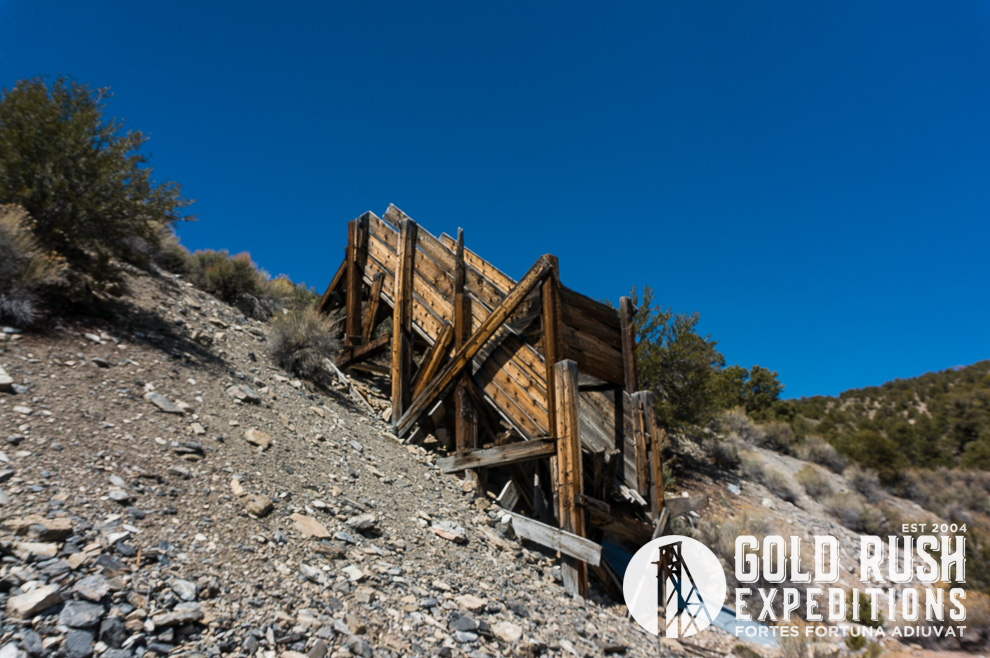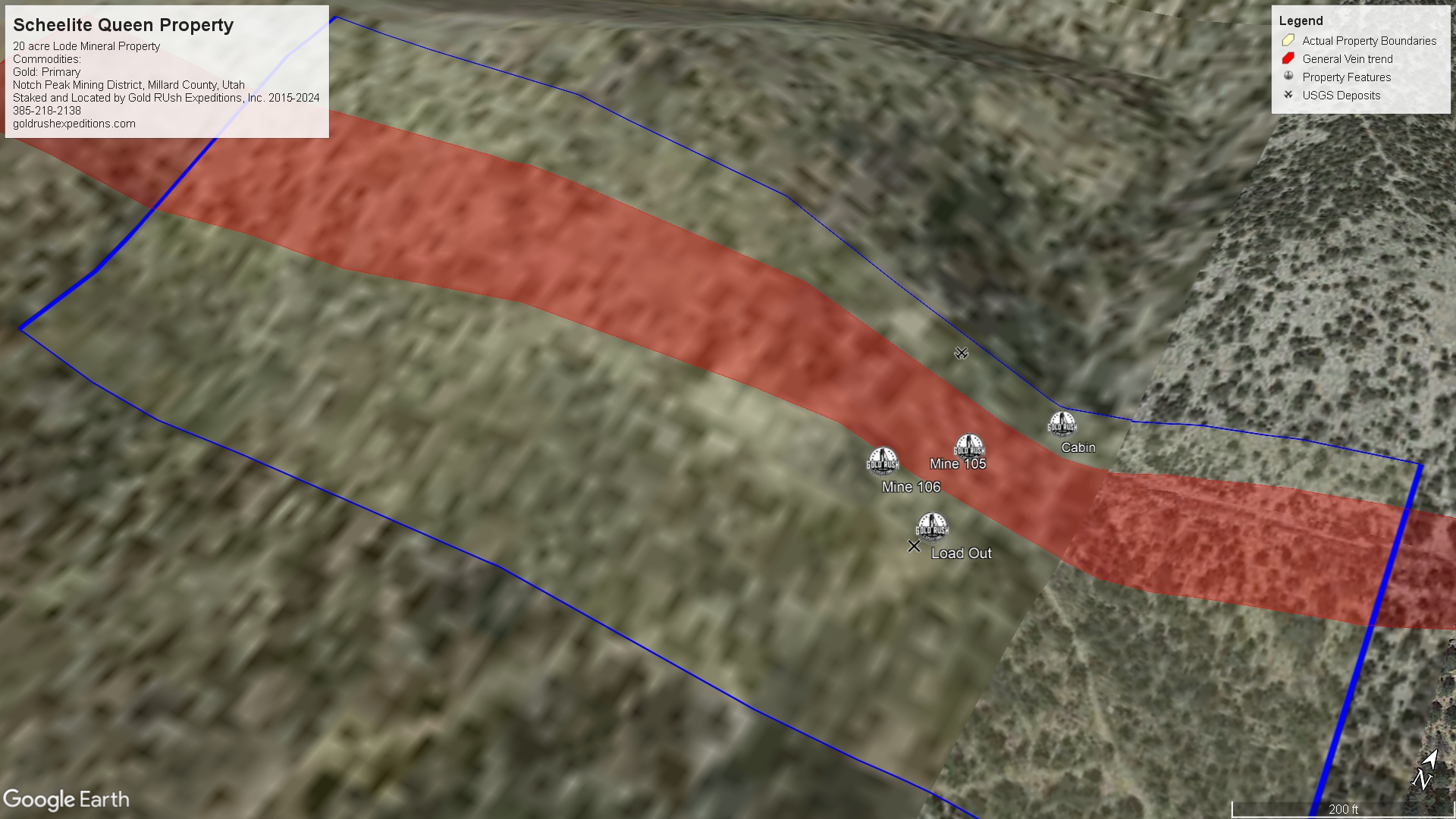



Click to read more...
Property Overview
The Scheelite Queen is one of very few available properties in the oasis of the Amasa Valley. The Amasa Valley is known for ancient gold production. In the early 1800s when settlers were coming into the area they found old sluice boxes carved from massive old logs. Many cuts and arrastras all used for processing of gold.
The Amasa valley has very little documented history except for a lot of orally passed down tales. Gold has been historically found in placers in the valley, which has to flow from somewhere, so its no surprise that the mines above the placers show more gold and quartz than scheelite.
Scheelite was common with tungsten and gold deposits and has been used as a tungsten indicator to drive federal funding for tungsten deposits in historical gold mines. The Amasa valley properties are no different.
The Scheelite Queen is documented to have been worked in the 1920s, and then from 1947-1957. Strictly for gold. This is when the main or 105 tunnel was cut. In 1971, Amasa Valley Gold Mines re-timbered the old workings and cut in on a dark iron and moly vein that carried values in gold. The target was molybdenum until the gold standard was lifted in late 1971 and then the actual target of gold was reported. The company cut at least 600' on the upper adit, they reported recovery of 200 ounces of gold from 1971-1973. In 1974 the company went private and did not report any further earnings. They worked and held the property until 1983. In 1981, a resurgence in gold prices brought the mine back on line but only for a few months. The Amasa Valley Gold Mines disbanded their charter in December 1983.
The mine exist with easily visible gold deposits in quartz on iron viens. There are over 800' of documented subsurface workings on two main levels.
The mines could be worked for sample material and the operator would likely do well. Otherwise it could be developed just as any other mine.
Assay values consistently returned gold values at 1/2 oz. AU per ton. There are no documented reserves and the majority of the dumps and tails have been washed away or processed. This would indicate that much of even the muck showed good values worth exporting.
There is no technical reporting available for this site.
There are excellent roads from the main highway to the mine and around the Amasa Valley. High clearance 4WD is recommended for steep inclines and any inclement weather which turns the silty soil to a slippery clay.
Gold Rush Expeditions, Inc. does offer mining consultation services and assistance with permits for a small fee.
Training courses for underground work and exploration can be found here: https://stayoutstayalive.com/training/
The Scheelite Queen is one of very few available properties in the oasis of the Amasa Valley. The Amasa Valley is known for ancient gold production. In the early 1800s when settlers were coming into the area they found old sluice boxes carved from massive old logs. Many cuts and arrastras all used for processing of gold.
The Amasa valley has very little documented history except for a lot of orally passed down tales. Gold has been historically found in placers in the valley, which has to flow from somewhere, so its no surprise that the mines above the placers show more gold and quartz than scheelite.
Scheelite was common with tungsten and gold deposits and has been used as a tungsten indicator to drive federal funding for tungsten deposits in historical gold mines. The Amasa valley properties are no different.
The Scheelite Queen is documented to have been worked in the 1920s, and then from 1947-1957. Strictly for gold. This is when the main or 105 tunnel was cut. In 1971, Amasa Valley Gold Mines re-timbered the old workings and cut in on a dark iron and moly vein that carried values in gold. The target was molybdenum until the gold standard was lifted in late 1971 and then the actual target of gold was reported. The company cut at least 600' on the upper adit, they reported recovery of 200 ounces of gold from 1971-1973. In 1974 the company went private and did not report any further earnings. They worked and held the property until 1983. In 1981, a resurgence in gold prices brought the mine back on line but only for a few months. The Amasa Valley Gold Mines disbanded their charter in December 1983.
The mine exist with easily visible gold deposits in quartz on iron viens. There are over 800' of documented subsurface workings on two main levels.
The mines could be worked for sample material and the operator would likely do well. Otherwise it could be developed just as any other mine.
Assay values consistently returned gold values at 1/2 oz. AU per ton. There are no documented reserves and the majority of the dumps and tails have been washed away or processed. This would indicate that much of even the muck showed good values worth exporting.
There is no technical reporting available for this site.
There are excellent roads from the main highway to the mine and around the Amasa Valley. High clearance 4WD is recommended for steep inclines and any inclement weather which turns the silty soil to a slippery clay.
Gold Rush Expeditions, Inc. does offer mining consultation services and assistance with permits for a small fee.
Training courses for underground work and exploration can be found here: https://stayoutstayalive.com.training/
Acres
Commodities
Type
20
Gold, Molybdenum
Lode
Underground Dev
Surface Dump
Tailings
800 feet
N/A
N/A
Access
Features
High Clearance 4WD
Multiple Load Outs
Gold Reserves
Silver Reserves
Copper Reserves
Platinum Reserves
Tungsten Reserves
Molybdenum Reserves
Undefined
N/A
N/A
N/A
N/A
Undefined


(385) 218-2138
or use our contact form below